Spartacus Review
The British Monarchy
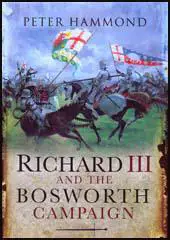
Title: Richard III and the Bosworthy Campaign
Author: Peter Hammond
Editor:
Publisher: Pen & Sword
Price: £19.95
Bookshop: Amazon
Spartacus Website: Richard III
Category:
On 22 August 1485 the forces of the Yorkist king Richard III and his Lancastrian opponent Henry Tudor, Earl of Richmond clashed at Bosworth Field in Leicestershire in one of the decisive battles of English history. Richard was defeated and killed. Henry took the crown as Henry VII, established the Tudor dynasty and set English history on a new course. For the last 500 years this, the most famous battle of the Wars of the Roses, has excited passionate interest and continuing controversy.
Peter Hammond, in a vivid and perceptive account of the battle, retells the story of the tangled dynastic and personal rivalries that provoked the conflict, describes the preparations of the two converging armies and offers a gripping analysis of the contest itself. The latest documentary and archaeological evidence is considered, and the author weighs up the merits of conflicting interpretations of the battle and the battlefield. He also pays particular attention to the contrasting characters of Richard III and Henry Tudor, the villain and the victor of the drama, who are reconsidered as individuals and as commanders. This lucid, authoritative and readable new history will be essential reading for anyone who is intrigued by the short, unhappy reign of Richard III and the trial of strength that destroyed him.
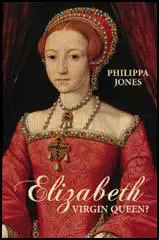
Title: Elizabeth: Virgin Queen
Author: Philippa Jones
Editor:
Publisher: New Holland
Price: £9.99
Bookshop: Amazon
Spartacus Website: Queen Elizabeth I
Category:
'Gloriana', 'Faerie Queene', 'Queen Bess' are just some of the names given to Elizabeth I, the daughter of Henry VIII and Anne Boleyn. But the name for which she is perhaps best remembered and which best explains why Elizabeth was the last of the Tudor monarchs, was the 'Virgin Queen'. But how appropriate is that image? Were Elizabeth's suitors and favourites really just innocent intrigues? Or were they much more than that? Was Elizabeth really a woman driven by her passions, who had affairs with several men, including Thomas Seymour, while he was still the husband of her guardian Catherine Parr, and Robert Dudley, Earl of Leicester - a man adjudged to have been the great love of her life? And, are the rumours of Elizabeth's illegitimate children true? Was the 'Virgin Queen' image a carefully thought out piece of Tudor propaganda? Historian Philippa Jones, author of the acclaimed "The Other Tudors", challenges the many myths and truths surrounding Elizabeth's life and reveals the passionate woman behind the powerful and fearless 'Virgin Queen'.
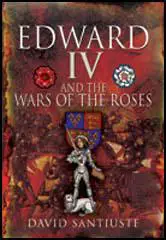
Title: Edward IV and the War of the Roses
Author: David Santiuste
Editor:
Publisher: Pen & Sword
Price: £19.99
Bookshop: Amazon
Spartacus Website: Edward IV
Category:
Indisputably the most effective general of the Wars of the Roses, Edward IV died in his bed, undefeated in battle. Yet Edward has not achieved the martial reputation of other warrior kings such as Henry V - perhaps because he fought battles against his own people in a civil war. It has also been suggested that he lacked the personal discipline expected of a truly great commander. But, as David Santiuste shows in this perceptive and highly readable new study, Edward was a formidable military leader whose strengths and subtlety have not been fully recognized.
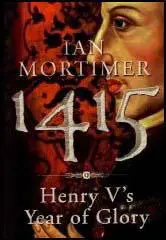
Title: Henry V's Year of Glory
Author: Ian Mortimer
Editor:
Publisher: Bodley Head
Price: £20.00
Bookshop: Amazon
Spartacus Website: Henry V
Category:
Henry V is regarded as the great English hero. Lionized in his own day for his victory at Agincourt, his piety and his rigorous application of justice, he was elevated by Shakespeare into a champion of English nationalism for all future generations. But what was he really like? Does he deserve to be thought of as 'the greatest man who ever ruled England?'. In this groundbreaking and ambitious book, Ian Mortimer portrays Henry in the pivotal year of his reign. Recording the dramatic events of 1415 on a day-by-day basis, he offers the fullest, most precise and least romanticized view we have of Henry and what he did. In addition, the king's story is told against the background of other important developments in Europe, in particular the struggle for power within the Catholic Church and official attempts to eradicate any deviant religious beliefs. In so doing the reader encounters unexpected and eye-opening explanations for why Henry tried to unify the kingdoms of England and France - and why he was prepared to burn men alive as heretics. The result is not only a fascinating reappraisal of Henry; it brings to the fore many unpalatable truths which biographers and military historians have largely ignored. While Henry retains the essential qualities of his greatness, his legend is stripped of its Shakespearean rhetoric and compassion. At the center of the book is the campaign which culminated in the battle of Agincourt: a slaughter ground designed not to advance England's interests directly but to demonstrate God's approval of Henry's royal authority on both sides of the Channel. 1415 was a year of religious persecution, personal suffering and one horrendous battle. This is the story of that year, as seen over the shoulder of its most cold-hearted, most ambitious and most celebrated hero.
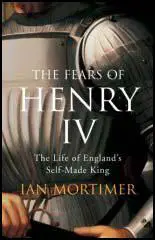
Title: The Fears of Henry IV
Author: Ian Mortimer
Editor:
Publisher: Vintage
Price: £8.99
Bookshop: Amazon
Spartacus Website: Henry IV
Category:
In June 1405, King Henry IV stopped at a small Yorkshire manor house to shelter from a storm. That night he awoke screaming that traitors were burning his skin. His instinctive belief that he was being poisoned was understandable: he had already survived at least eight plots to dethrone or kill him in the first six years of his reign. Henry IV had not always been so unpopular. In his youth he had been a great chivalric champion and crusader. The son of John of Gaunt, he was courteous, confident, well-educated, generous, devoted to his family, musical and spiritually fervent. In 1399, at the age of thirty-two, he was enthusiastically greeted as the saviour of the realm when he ousted from power the insecure and tyrannical King Richard II. But therein lay Henry’s weakness. In making himself king he had broken God's law and left himself starkly open to criticism.
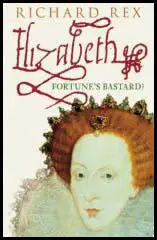
Title: Elizabeth: Fortune's Bastard
Author: Richard Rex
Editor:
Publisher: Tempus
Price: £9.99
Bookshop: Amazon
Spartacus Website: Elizabeth I
Category:
Elizabeth I stands in the English imagination for one of the formative phases of English history. Her reign saw England transformed, at her command, from a Catholic to a Protestant country, with incalculable consequences for the history of Europe and of the world - starting with the attempted invasion by the Spanish Armada, beaten off by the Queen's legendary naval captains. Of the five monarchs who trod the political stage of sixteenth-century England, Elizabeth was the most accomplished and versatile performer. And it is ultimately this which accounts for her enduring fascination. Richard Rex highlights the vivid and contrary personality of a Queen who could both baffle and bedazzle her subjects, her courtiers, and her rivals: at one moment flirting outrageously with a favourite or courting some foreign prince, and at another vowing perpetual virginity; at one time agonising over the execution of her cousin, Mary Queen of Scots, then ordering the slaughter of hundreds of poor men after a half-cock rebellion. Too many biographies of Elizabeth merely perpetuate the flattery she enjoyed from her courtiers, as if her dramatic repertoire was limited to the role of 'Gloriana'. This biography also reflects more critical voices, such as those of the Irish, the Catholics and those who lived on the wrong side of the emerging North/South divide. To them she showed a different face.
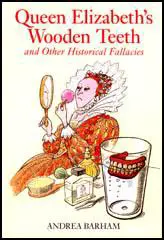
Title: Queen Elizabeth's Wooden Teeth
Author: Andrea Barham
Editor:
Publisher: Michael O'Mara
Price: £9.99
Bookshop: Amazon
Spartacus Website: The Tudors
Category:
"Queen Elizabeth's Wooden Teeth" focuses on the erroneous facts that continue to distort the annals of world history. To counter all those fabricated facts you have learnt through the years, here is a guide to the truth behind the myths, including: Sir Walter Raleigh did not bring the potato nor tobacco back from the New World; Abraham Lincoln did not write the Gettysburg Address on the back of an envelope; King Ethelred the Unready was not unprepared; St George was not English; and of course Queen Elizabeth did not have wooden teeth! Written with wit and fascinating insight, and covering numerous subjects from royalty to religion, saints to statesmen, inventors to explorers, "Queen Elizabeth's Wooden Teeth" is guaranteed to astonish and inform, amuse and entertain.
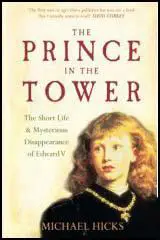
Title: The Prince in the Tower
Author: Michael Hicks
Editor:
Publisher: Tempus
Price: £9.99
Bookshop: Amazon
Spartacus Website: Edward V
Category:
This is the first biography of the king whose fate remains one of the greatest mysteries in English history. Memorable not for his life but his death, Edward V is probably better known as one of the Princes in the Tower, the supposed victim of his uncle, Richard III. Though he was never crowned, Edward reigned for 77 days until Richard made himself his nephew's Lord Protector before imprisoning him and his younger brother Richard in the Tower of London. Michael Hicks presents to us the backdrop to this tragically short life - Edward's parents, the contemporary political scenery, his own remarkable achievements - and reveals how he was both the hope of a dynasty and an integral cause of that dynasty's collapse.
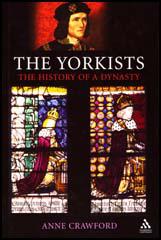
Title: The Yorkists: The History of a Dynasty
Author: Anne Crawford
Editor:
Publisher: Continuum
Price: £19.99
Bookshop: Amazon
Spartacus Website: Richard III
Category:
The Yorkists include both the most wicked king in English history, Richard III, and the most tragic, his nephew Edward V, one of the Princes in the Tower. They had come to the throne in 1461, when Edward IV, who traced his claim to Edward III, replaced the ineffectual Henry VI as king. Forced into exile in 1470, Edward returned to power after the bloody battle of Towton in 1470 finally ended Lancastrian opposition. His reign was ended by his premature death in 1483, leaving behind his son Edward, a minor, as his heir. This led to Richard III's ursurpation, ended two years later by his defeat and death at Bosworth Field at the hands of Henry Tudor, who became Henry VII and the founder of a new dynasty, marrying Elizabeth of York, the daughter of Edward IV. The Yorkists were one of the two main contending parties in England's first great civil war, the Wars of the Roses. They have been immortalised by Shakespeare not only in his Richard III but also in his three parts of Henry VI. Anne Crawford examines the truth behind both the characters of these kings and behind the stories in the plays, including the death of the duke of Clarence by drowning in a butt of malmsey and the celebrated murder of his nephews, Edward V and Richard, duke of York, by their uncle, Richard III.
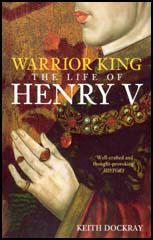
Title: Warrior King: The Life of Henry V
Author: Keith Dockery
Editor:
Publisher: Tempus
Price: £12.99
Bookshop: Amazon
Spartacus Website: Henry V
Category:
The wild and headstrong prince of William Shakespeare's "Henry IV", blossoms in "Henry V", into a veritable hero-king: an epic embodiment of military valour, serious-minded, and, above all, an archetypal man of action. Such a portrayal reflected not only Shakespeare's Tudor sources but contemporary estimates of "Henry V". For his earliest English biographer, a royal chaplain and well-informed insider, he was a model Christian prince, clearly carrying out God's wishes both at home and abroad; the chronicler Thomas Walsingham, writing soon after the king's death in 1422, judged him a pious, prudent, distinguished and warlike ruler; and, for the humanist Tito Livio in about 1437, he was an energetic, just and shrewd military commander who, at Agincourt, fought 'like an unvanquished lion'. Modern historians have perpetuated the flattery of chroniclers but should they? Was the real Henry V a national hero, a jingoistic bigot, or neither?
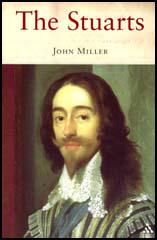
Title: The Stuarts
Author: John Miller
Editor:
Publisher: Continuum
Price: £14.99
Bookshop: Amazon
Spartacus Website: The Stuarts
Category:
When James VI of Scotland succeeded Elizabeth as James I on the throne of England in 1603, the Stuarts became the first dynasty to rule Britain as a whole. The problems that James and his successors encountered in reconciling their kingdoms led to tensions and revolts in Scotland, Ireland and England itself, leading to the Civil War under Charles I between 1642 and 1646, and to the king's subsequent execution. While Charles II, restored after Cromwell's Interregnum, died on the throne, his brother James II quickly alienated much of the political nation and had to flee abroad after an invasion by his son-in-law, who became William III. Following William's death, James's daughter Anne presided over a period of victory on the Continent, but bitter internal tension at home. Her death without an heir in 1714 brought in the Hanoverians. In "The Stuarts", John Miller looks at the individual monarchs who made up this remarkable dynasty. He also examines the history of the dynasty as a whole, in terms of the Stuarts' identity and agenda as a ruling house.
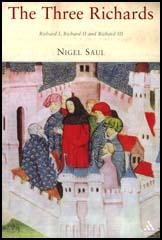
Title: The Three Richards
Author: Nigel Saul
Editor:
Publisher: Continuum
Price: £14.99
Bookshop: Amazon
Spartacus Website: Richard II
Category:
The three Richards who ruled England in the middle ages were among the most controversial and celebrated English kings. Richard I (‘Coeur de Lion’, 1189-99) was a great crusading hero; Richard II (1377-99) was an authoritarian aesthete deposed by his cousin, Henry IV, and murdered; while Richard III (1483-85) as the murderer of his nephews, the Princes in the Tower, was the most notorious villain in English history. This highly readable joint biography shows how much the three kings had in common, apart from their names. All were younger sons, not expected to come to the throne; all failed to leave a legitimate heir, causing instability on their deaths; all were cultured and pious; and all died violently. All have attracted accusations but also fascination. In comparing them, Nigel Saul tells three gripping stories and shows what it took to be a medieval king.
